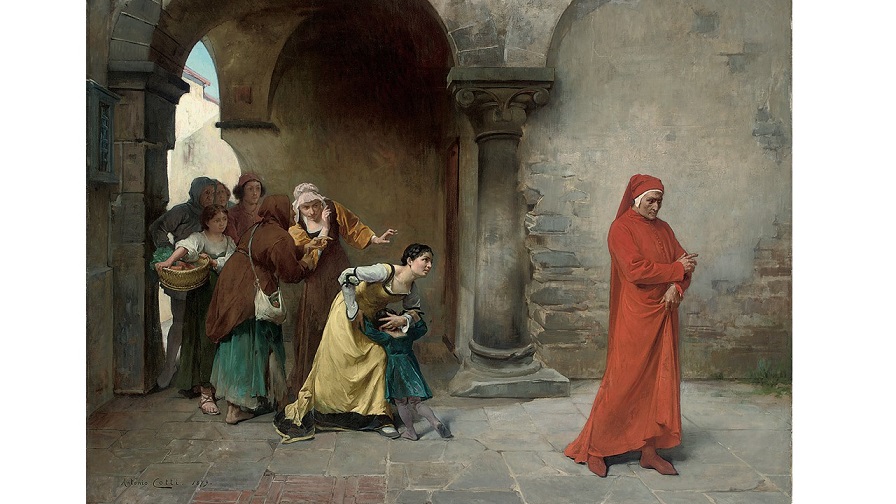.
Self-Exile
“Parue—nec inuideo—sine me, liber, ibis in urbem.” —Ovid
While driving underneath I had to pray:
the tunnel, God, had better not cave in—
as if New York could make the earth obey.
My Lord, I won’t let New York City win.
I well recall the moment’s clarity
as Ovid did when forced to flee from Rome.
But not with tears, instead with charity.
I’m free from what I used to call my home.
No one told me I had to leave midday.
I didn’t have to slink away at night.
New York’s Mayor couldn’t have made me stay.
But if he could would he have stopped my flight?
What if he knew that all my worldly wares
(besides the stuff I crammed into my car),
the pension, bank savings, the Wall-Street shares
and every dime I’ll happily spend afar,
in some quaint rural cow-surrounded town
or Mexico if traveling by bus—
whatever place I choose to settle down,
would he pursue this single exodus?
I sold the furniture but not the books.
I left some plants I’d had for thirty years.
Endured my friends’ mostly envious looks,
a “you’ll be back,” and some derisive sneers.
Unlike Ovid, I had no distraught wife
that needed consolation, her tears washed,
or daughter with a separated life.
Those dreams the city had already quashed.
I had a job but what the hell was that?
No more cubicles, no more clacking keys.
No more in the fluorescent habitat,
with half a dozen soulless Bartlebys.
Yet somehow in that city I found God.
But I won’t camp inside the catacombs.
The tunnel is a glorious promenade
compared to those dark passages of Rome’s.
Ovid sent up multiple prayers and wails
to many gods that they might change his course.
He kissed a hearth, discerned a bird’s entrails.
Nothing he did could stop that great divorce.
Mine, however, gives me the greatest joy.
I’d write this on a theater marquee:
He must have used the city as a ploy
because I never prayed but God found me.
Maybe John Paul II was right when he said
New York reigns as capital of the world.
Which one? Dante’s city for hell’s own dead
where God’s greatest light deniers are hurled?
Or maybe Augustine’s city of man—
yes, filled with many people who believe
yet cannot stop the vandals with their plan
to riot, pillage, loot and burn and thieve?
When that last altar in that city closes
then flee and don’t look back while God disposes.
.
.
Geoffrey Smagacz writes from South Carolina and Mexico. A collection of his fiction, published under the title of A Waste of Shame and Other Sad Tales of the Appalachian Foothills (Wiseblood Books, 2013), won the 2014 Independent Publisher gold medal for Best Mid-Atlantic Regional Fiction. His rhymed and metered poetry has also been published in various literary magazines and e-zines, including The Classical Poetry Society, 14 by 14 and Dappled Things. Look for Geoffrey’s latest novel, Reportedly Murdered: A Gregory Thackery Mystery (Wipf and Stock Publishers), in April (fingers crossed), written under his nom de plume, Geoffrey Walters.
















Good classic concept, Geoffrey. Not only Ovid and Dante, but every American (or immigrant to America) leaving for his own place on the Great Frontier. Exile becomes more of an escape. That is a real theme here, from your freely speculating on who or what might stop you, to your leaving behind believers and altars you knew. Those words near the end reinforce and reintroduce your references to God, with the ultimate conviction that He disposes. Fine story! Best wishes in your new homes.
Thank you, Margaret. It’s not only about escaping NYC, it’s about leaving behind the prevailing secular-socialist culture emanating from its worldly epicenter.
Geoffery –
I too experienced the thrill of escape, after coming to the realization of the limited nature of that place where there is so much to offer,
Why do so many fail to search and learn ? Who knows?
You got out !
I’m happy to say that I did escape NYC. But my friends who remain live in fear.
This is really a wonderful and engaging description of your odyssey out of an earthly hell. I especially love the eighth verse, with its reference to “half a dozen soulless Bartlebys”, and the fun bonus of using that name as a rhyming word! Also, the subtle reference, in the last line, to Sodom and Gomorrah, was perfect. I could feel, and identify with, your emotion as I read the story.
Melville’s “Bartleby, the Scrivener: A Story of Wall Street” turned out to be the story of my life. It took me 30 years to say, “I prefer not to.”
Very nice flow, apt and clever references. U-Haul should put this in their New York City advertising, at the rate people are fleeing that place. And it’s funny how all metaphor in poetry about urban spaces these days just spirals into the infernal. I wonder if any of the bien-pensant elites will ever read between the lines, so to speak?
One little quibble: I couldn’t place the dependent clause for stanza 4, line 1, “What if he knew that all my worldly wares/” None of the subsequent 7 lines in that sentence seems to complete that thought. What am I missing? Otherwise, great read, thanks.
Thanks for your comment and your question. Regarding the clause, it takes seven lines to get to it. “What if he knew that all my worldly wares,” blah blah blah, “would he pursue this single exodus?” Perhaps it needed an em dash at the end of line seven instead of a comma. I opted for the comma.